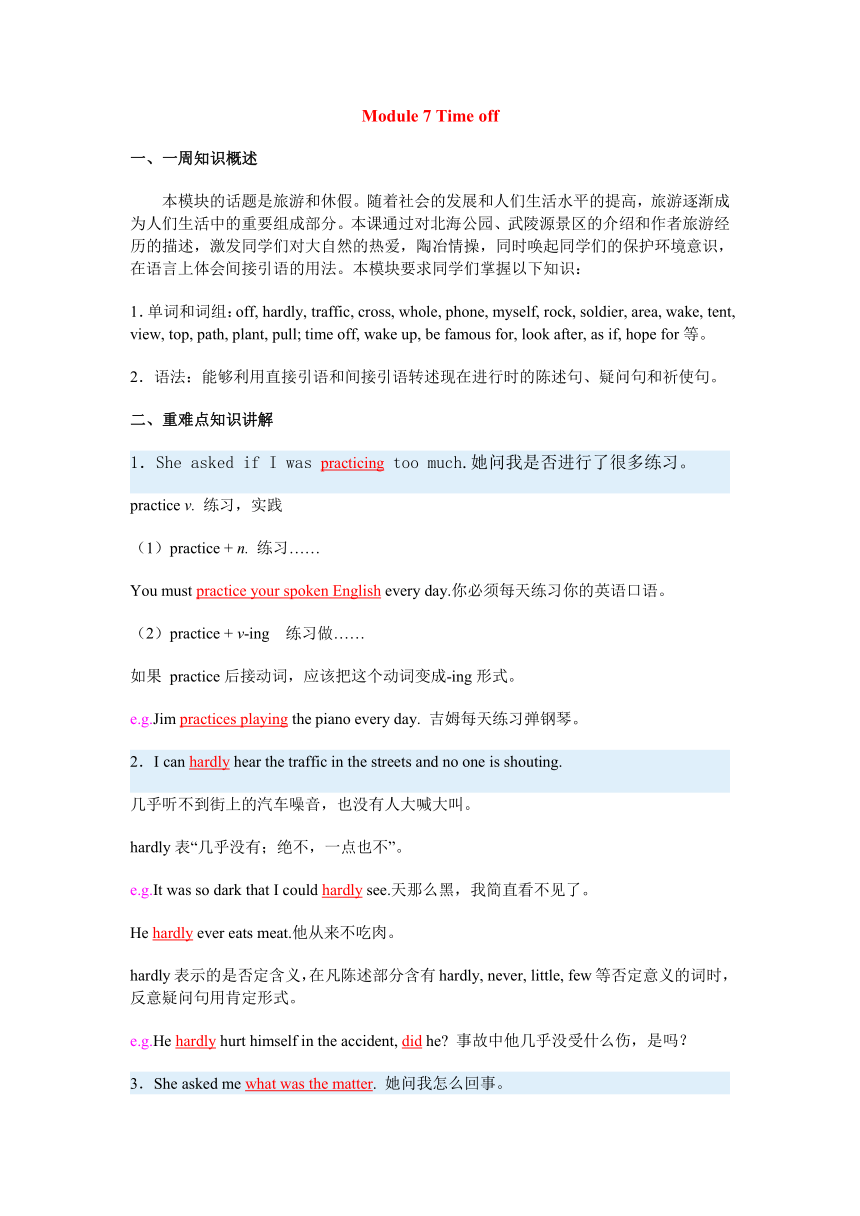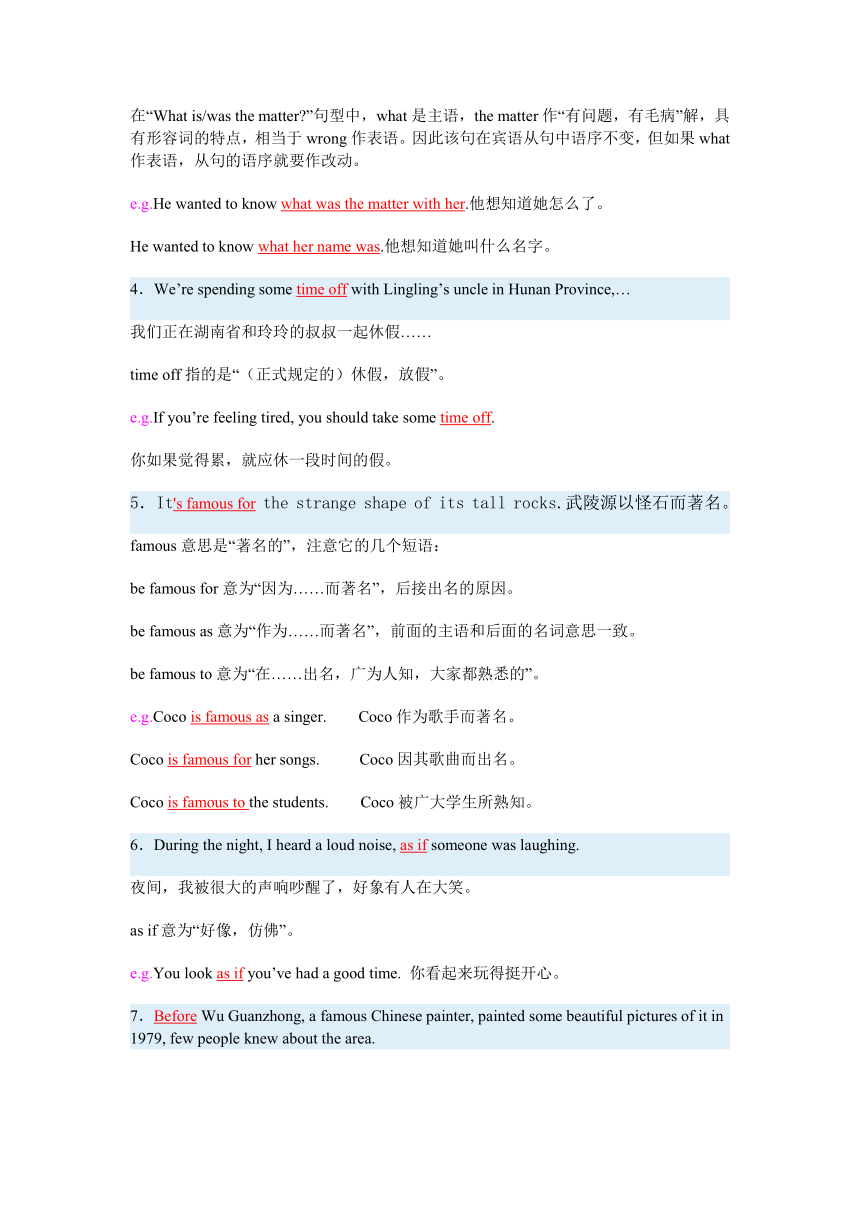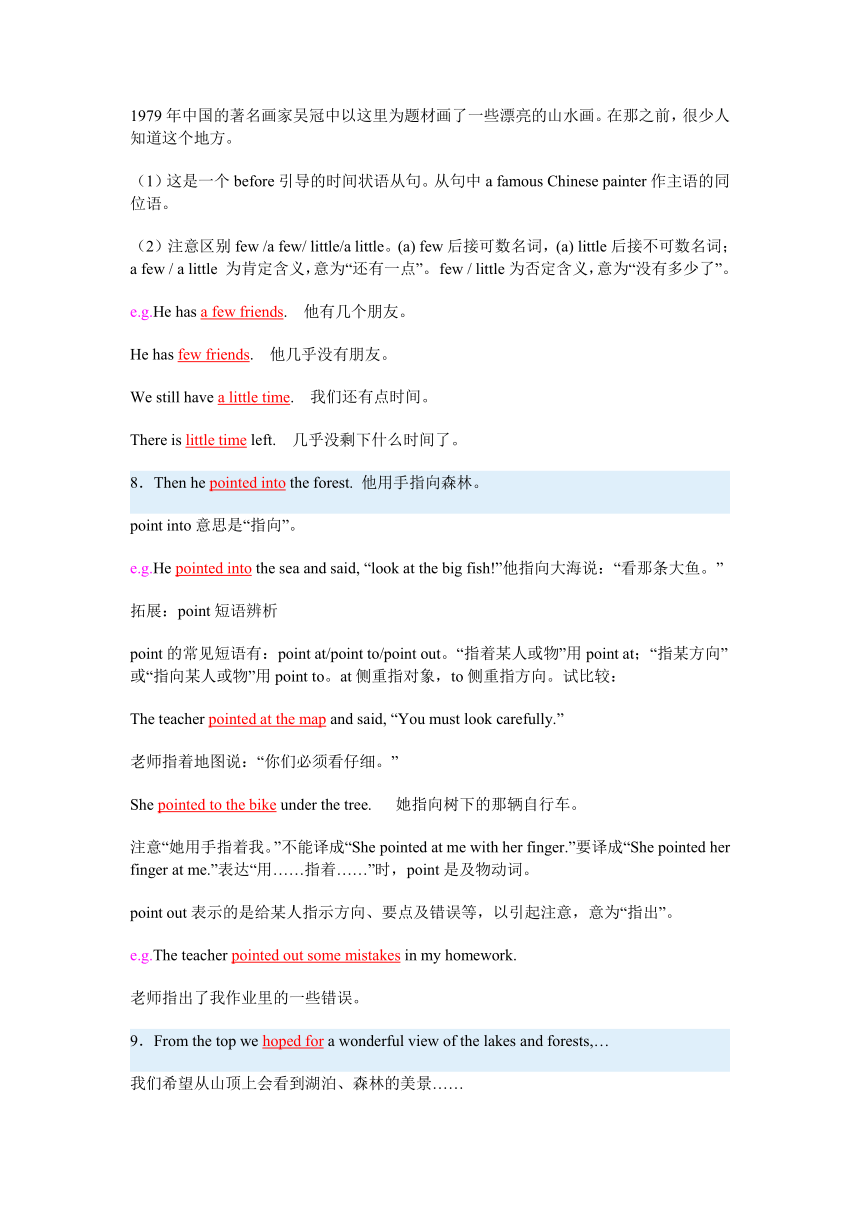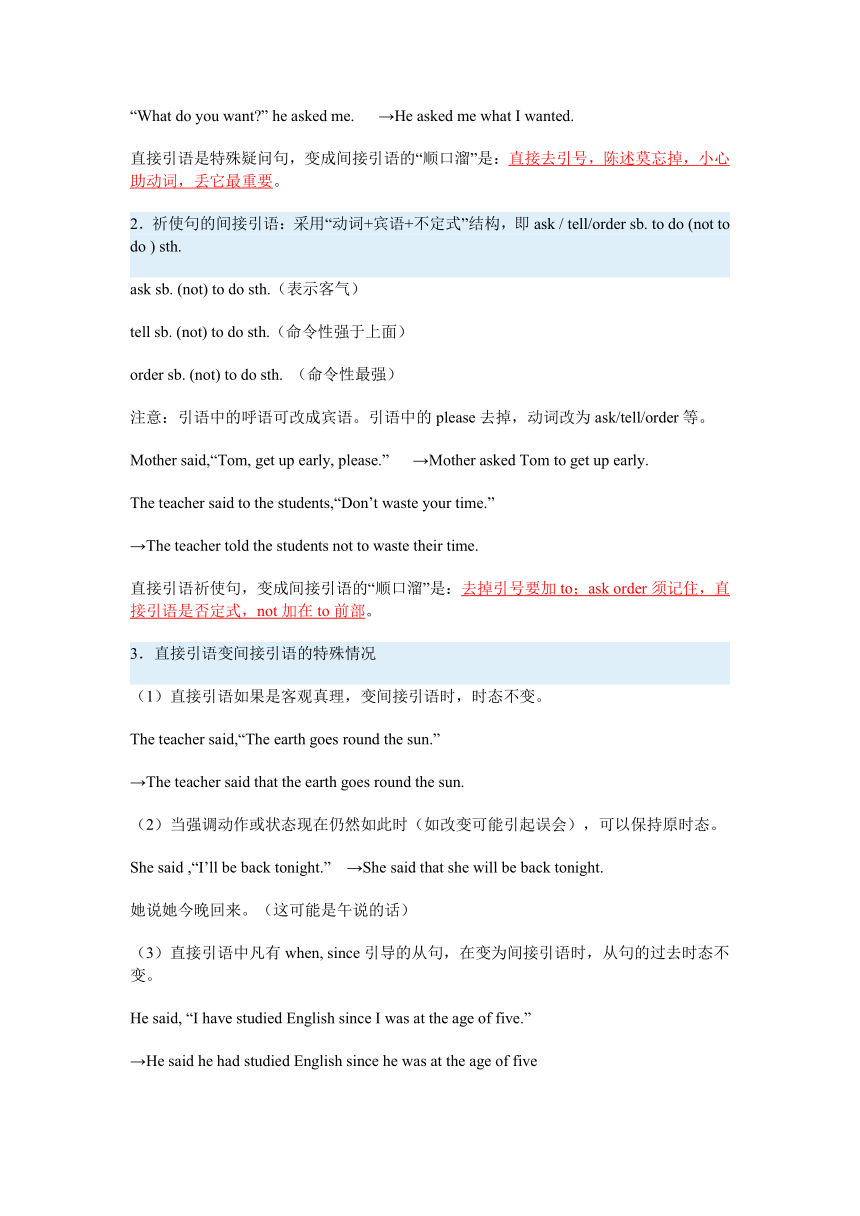八年级下>Module 7 Time off>本模块综合与测试
文档属性
| 名称 | 八年级下>Module 7 Time off>本模块综合与测试 |  | |
| 格式 | zip | ||
| 文件大小 | 23.2KB | ||
| 资源类型 | 教案 | ||
| 版本资源 | 外研版 | ||
| 科目 | 英语 | ||
| 更新时间 | 2013-05-21 08:05:50 | ||
图片预览





文档简介
Module 7 Time off
一、一周知识概述
本模块的话题是旅游和休假。随着社会的发展和人们生活水平的提高,旅游逐渐成为人们生活中的重要组成部分。本课通过对北海公园、武陵源景区的介绍和作者旅游经历的描述,激发同学们对大自然的热爱,陶冶情操,同时唤起同学们的保护环境意识,在语言上体会间接引语的用法。本模块要求同学们掌握以下知识:
1.单词和词组:off, hardly, traffic, cross, whole, phone, myself, rock, soldier, area, wake, tent, view, top, path, plant, pull; time off, wake up, be famous for, look after, as if, hope for等。
2.语法:能够利用直接引语和间接引语转述现在进行时的陈述句、疑问句和祈使句。
二、重难点知识讲解
1.She asked if I was practicing too much.她问我是否进行了很多练习。
practice v. 练习,实践
(1)practice + n. 练习……
You must practice your spoken English every day.你必须每天练习你的英语口语。
(2)practice + v-ing 练习做……
如果 practice后接动词,应该把这个动词变成-ing形式。
e.g.Jim practices playing the piano every day. 吉姆每天练习弹钢琴。
2.I can hardly hear the traffic in the streets and no one is shouting.
几乎听不到街上的汽车噪音,也没有人大喊大叫。
hardly表“几乎没有;绝不,一点也不”。
e.g.It was so dark that I could hardly see.天那么黑,我简直看不见了。
He hardly ever eats meat.他从来不吃肉。
hardly表示的是否定含义,在凡陈述部分含有hardly, never, little, few等否定意义的词时,反意疑问句用肯定形式。
e.g.He hardly hurt himself in the accident, did he 事故中他几乎没受什么伤,是吗?
3.She asked me what was the matter. 她问我怎么回事。
在“What is/was the matter ”句型中,what是主语,the matter作“有问题,有毛病”解,具有形容词的特点,相当于wrong作表语。因此该句在宾语从句中语序不变,但如果what作表语,从句的语序就要作改动。
e.g.He wanted to know what was the matter with her.他想知道她怎么了。
He wanted to know what her name was.他想知道她叫什么名字。
4.We’re spending some time off with Lingling’s uncle in Hunan Province,…
我们正在湖南省和玲玲的叔叔一起休假……
time off指的是“(正式规定的)休假,放假”。
e.g.If you’re feeling tired, you should take some time off.
你如果觉得累,就应休一段时间的假。
5.It's famous for the strange shape of its tall rocks.武陵源以怪石而著名。
famous意思是“著名的”,注意它的几个短语:
be famous for意为“因为……而著名”,后接出名的原因。
be famous as意为“作为……而著名”,前面的主语和后面的名词意思一致。
be famous to意为“在……出名,广为人知,大家都熟悉的”。
e.g.Coco is famous as a singer. Coco作为歌手而著名。
Coco is famous for her songs. Coco因其歌曲而出名。
Coco is famous to the students. Coco被广大学生所熟知。
6.During the night, I heard a loud noise, as if someone was laughing.
夜间,我被很大的声响吵醒了,好象有人在大笑。
as if意为“好像,仿佛”。
e.g.You look as if you’ve had a good time. 你看起来玩得挺开心。
7.Before Wu Guanzhong, a famous Chinese painter, painted some beautiful pictures of it in 1979, few people knew about the area.
1979年中国的著名画家吴冠中以这里为题材画了一些漂亮的山水画。在那之前,很少人知道这个地方。
(1)这是一个before引导的时间状语从句。从句中a famous Chinese painter作主语的同位语。
(2)注意区别few /a few/ little/a little。(a) few后接可数名词,(a) little后接不可数名词;a few / a little 为肯定含义,意为“还有一点”。 few / little为否定含义,意为“没有多少了”。
e.g.He has a few friends. 他有几个朋友。
He has few friends. 他几乎没有朋友。
We still have a little time. 我们还有点时间。
There is little time left. 几乎没剩下什么时间了。
8.Then he pointed into the forest. 他用手指向森林。
point into意思是“指向”。
e.g.He pointed into the sea and said, “look at the big fish!”他指向大海说:“看那条大鱼。”
拓展:point短语辨析
point的常见短语有:point at/point to/point out。“指着某人或物”用point at;“指某方向”或“指向某人或物”用point to。at侧重指对象,to侧重指方向。试比较:
The teacher pointed at the map and said, “You must look carefully.”
老师指着地图说:“你们必须看仔细。”
She pointed to the bike under the tree. 她指向树下的那辆自行车。
注意“她用手指着我。”不能译成“She pointed at me with her finger.”要译成“She pointed her finger at me.”表达“用……指着……”时,point是及物动词。
point out表示的是给某人指示方向、要点及错误等,以引起注意,意为“指出”。
e.g.The teacher pointed out some mistakes in my homework.
老师指出了我作业里的一些错误。
9.From the top we hoped for a wonderful view of the lakes and forests,…
我们希望从山顶上会看到湖泊、森林的美景……
hope for后面往往接名词。
e.g.We’re hoping for good weather. 我们在盼望好天气。
We hope for an early answer to our letter. 盼早日回信。
以下是hope常用句型,请同学们仔细观察:
I hope you have a nice house with a big garden. (hope +从句)
我希望你能有一个带大花园的房子。
Tom, hopes to come to visit the Blacks in the near future. (hope to do sth.)
汤姆希望能在不久的将来拜访布莱克一家人。
注意hope后面不能接复合结构,即hope sb. to do sth是错误的。
10.Wish you were here! 你们如果能在这儿多好啊!
wish一般用来表达不能实现或没有把握实现的愿望,这种愿望是不真实的,所以其宾语从句谓语动词用虚拟语气(大家只需了解这句话的含义,虚拟语气的用法不用掌握,此处作简单介绍。),译成汉语时可用“要是……就好了,但愿……”等。
e.g.I wish I knew more about the subject. 我(现在)要是对这门学科懂得多些就好了。
How I wish it weren’t raining. 我(现在)多么希望天(现在)不在下雨啊。
三、语法点拨——直接引语与间接引语(Ⅱ)
本周我们要学习除直接引语是陈述句以外的其他几种句子的间接引语。
1.疑问句的间接引语
(1)一般疑问句后连接代词用if或whether,而引述选择疑问句时用whether,引述动词用ask,没有间接宾语的可以加一个间接宾语me, him等。
She said to Tom,“Can you help me ” →She asked Tom if / whether he could help her.
She asked,“Is this book yours or his ” →She asked me whether that book was mine or his.
直接引语为一般疑问句,变成间接引语的“顺口溜”是:去掉引号加if/whether,陈述语序要记住,时态人称和状语,小心变化别马虎。
(2)引述特殊疑问句用原句中的疑问词做连接词,疑问语序改为陈述语序。
“What do you want ” he asked me. →He asked me what I wanted.
直接引语是特殊疑问句,变成间接引语的“顺口溜”是:直接去引号,陈述莫忘掉,小心助动词,丢它最重要。
2.祈使句的间接引语:采用“动词+宾语+不定式”结构,即ask / tell/order sb. to do (not to do ) sth.
ask sb. (not) to do sth.(表示客气)
tell sb. (not) to do sth.(命令性强于上面)
order sb. (not) to do sth. (命令性最强)
注意:引语中的呼语可改成宾语。引语中的please去掉,动词改为ask/tell/order等。
Mother said,“Tom, get up early, please.” →Mother asked Tom to get up early.
The teacher said to the students,“Don’t waste your time.”
→The teacher told the students not to waste their time.
直接引语祈使句,变成间接引语的“顺口溜”是:去掉引号要加to;ask order须记住,直接引语是否定式,not加在to前部。
3.直接引语变间接引语的特殊情况
(1)直接引语如果是客观真理,变间接引语时,时态不变。
The teacher said,“The earth goes round the sun.”
→The teacher said that the earth goes round the sun.
(2)当强调动作或状态现在仍然如此时(如改变可能引起误会),可以保持原时态。
She said ,“I’ll be back tonight.” →She said that she will be back tonight.
她说她今晚回来。(这可能是午说的话)
(3)直接引语中凡有when, since引导的从句,在变为间接引语时,从句的过去时态不变。
He said, “I have studied English since I was at the age of five.”
→He said he had studied English since he was at the age of five
窗体顶端
一、单项选择。
1.The teacher said,“Don’t be late, Mary.” →The teacher told ________.
A.Mary not to be late B.Mary to be not late
C.Mary not late D.not to be late, Mary
2.He asked her,“Where are you going ” →He asked her ________.
A.where was she going B.where is she going
C.where she was going D.where did she go
3.He said,“I must go at once.” →He said that ________ at once.
A.he had to go B.he has to go
C.he had gone D.he has gone
4.He said to me,“I wrote to my father yesterday.”
→He told me he had written to his father ________.
A.the yesterday B.before today
C.the day before D.the next day
5.The teacher asked,“Are you waiting for the bus ”
→The teacher asked ________ for the bus.
A.if I was waiting B.was I waiting
C.you are waiting D.I was waiting
6.The professor said that light ________ faster than sound.
A.travels B.traveledC.travel D.travelled
7.My mother told me to show my homework to her.
→My mother said to me,“Show ________ homework.”
A.her my B.me yourC.her your D.me his
8.He said,“Let’s leave the bag at the gate.”
→He suggested ________ the bag at the gate.
A.to leave B.to let leaveC.leaving D.to let
9.He asked me ________ with me.
A.what the matter is B.what the mater was
C.what’s the matter D.what was the matter
10.He asked , “ Are you a Party member or a League member ”
→He asked me _________.
A.am I a Party member or a League member
B.was I a Party member or a League member
C.whether I was a Party member or a League member
D.whether was I a Party member or a League member.
11.Your pet cat is ______ fat, you can’t give it ______ food any more.
A.too much, too many B.much too, too many
C.much too, too much D.too many, too much
12.—What was the weather like yesterday
—It was terrible. It rained so ______ that people could ______ go out.
A.hardly; hard B.hardly; hardlyC.hard; hardly D.hard; hard
13.It’s time for news. Please ________ the TV.
A.turn off B.turn downC.turn up D.turn on
14.The old man is famous _________ his great works and he is also famous _______ a great scientist.
A.for; for B.for; asC.as; as D.as; for
15.I hope ______ a good holiday.
A.having B.you to haveC.you’ll have D.you
窗体底端
一、根据句意或首字母完成单词。
1.Peter is h (从不)ever late.
2.T (交通)police are sometimes very polite.
3.Be careful when you c the street.
4.They told me the w (整个)story.
5.Please w me up at 8 o'clock.
6.I went into her t (帐篷)and she told me to sit down.
7.There was a narrow p (小路) through the forest.
8.Please give me a p when you get to Beijing.
二、翻译下列短语:
1.叫醒某人 2.以……而闻名 3.照看自己
4.数百个动物 5.摘一片叶子 6.把……单独留下
7.把……和……比较 8.制订计划做某事 9.整个家庭 10.第二大淡水湖 11.如果,仿佛 12.建议干某事 13.休假,放假 14.希望…… 15.指向 16.爬上
三、将下列句子变为间接引语。
1.“I’m sorry I don’t think I know you .”said Jeanne.
2.“I saw a note on my desk.”she said.
3.“I’ll go to your farm tomorrow.”he said to her.
4.“What do you want ” he ask me.
5.She said to Tom,“How are you feeling now ”
6.He said,“Did you see me last night ”
四、把下列句子变为直接引语。
1.I told him that I had lost my money and that I would find it.
2.She asked whether I would be free the next day or not.
3.I asked her where she was going and what she was going to do the next day.
4.His father told him not to climb that high tree in his new coat.
5.The stranger asked me what my name was.
6.She said that she would finish her work the next day.
7.The teacher asked if we could do it.
8.The commander ordered his men not to cross the river before dawn.
9.My teacher asked whether he was coming.
10.The scientist asked me what I was doing.
答案:1-5 ACACA 6-10 ABCDC 11-15 CCDBC
答案:1.hardly 2.Traffic 3.cross 4.whole
5.wake 6.Tent 7.path 8.Phone
答案:1.wake sb. Up 2.be famous for 3.look after oneself
4.hundreds of animals 5.pull a leaf 6.leave sb. alone
7.compare A with B 8.plan to do sth. 9.the whole family
10.the second largest fresh water lake 11.as if
12.suggest doing sth. 13.time off 14.hope for + n.
15.point into 16.climb up
答案: 1.Jeanne said that she was sorry she didn’t think she knew me.
2.She said that she had seen a note on the desk.
3.He told her that he would go to her farm the next day.
4.He asked me what I wanted. 5.She asked Tom how he was feeling then.
6.He asked me if / whether I had seen him the night before.
答案:1.I said to him,“I have lost my money. I will find it.”
2.She asked ,“You will be free tomorrow, won’t you ”/ She asked me, “Are you free tomorrow ”
3.I asked her,“Where are you going and what are you going to do tomorrow ”
4.His father said,“Don’t climb this high tree in your new coat.”
5.The stranger asked,“What’s your name ”
6.“I’ll finish my work tomorrow,”she said. 7.The teacher asked,“Can you do it ”
8.The commander ordered his men,“Don’t cross the river before dawn.”
9.My teacher asked,“Is he coming ”10.The scientist asked me,“What are you doing ”
一、一周知识概述
本模块的话题是旅游和休假。随着社会的发展和人们生活水平的提高,旅游逐渐成为人们生活中的重要组成部分。本课通过对北海公园、武陵源景区的介绍和作者旅游经历的描述,激发同学们对大自然的热爱,陶冶情操,同时唤起同学们的保护环境意识,在语言上体会间接引语的用法。本模块要求同学们掌握以下知识:
1.单词和词组:off, hardly, traffic, cross, whole, phone, myself, rock, soldier, area, wake, tent, view, top, path, plant, pull; time off, wake up, be famous for, look after, as if, hope for等。
2.语法:能够利用直接引语和间接引语转述现在进行时的陈述句、疑问句和祈使句。
二、重难点知识讲解
1.She asked if I was practicing too much.她问我是否进行了很多练习。
practice v. 练习,实践
(1)practice + n. 练习……
You must practice your spoken English every day.你必须每天练习你的英语口语。
(2)practice + v-ing 练习做……
如果 practice后接动词,应该把这个动词变成-ing形式。
e.g.Jim practices playing the piano every day. 吉姆每天练习弹钢琴。
2.I can hardly hear the traffic in the streets and no one is shouting.
几乎听不到街上的汽车噪音,也没有人大喊大叫。
hardly表“几乎没有;绝不,一点也不”。
e.g.It was so dark that I could hardly see.天那么黑,我简直看不见了。
He hardly ever eats meat.他从来不吃肉。
hardly表示的是否定含义,在凡陈述部分含有hardly, never, little, few等否定意义的词时,反意疑问句用肯定形式。
e.g.He hardly hurt himself in the accident, did he 事故中他几乎没受什么伤,是吗?
3.She asked me what was the matter. 她问我怎么回事。
在“What is/was the matter ”句型中,what是主语,the matter作“有问题,有毛病”解,具有形容词的特点,相当于wrong作表语。因此该句在宾语从句中语序不变,但如果what作表语,从句的语序就要作改动。
e.g.He wanted to know what was the matter with her.他想知道她怎么了。
He wanted to know what her name was.他想知道她叫什么名字。
4.We’re spending some time off with Lingling’s uncle in Hunan Province,…
我们正在湖南省和玲玲的叔叔一起休假……
time off指的是“(正式规定的)休假,放假”。
e.g.If you’re feeling tired, you should take some time off.
你如果觉得累,就应休一段时间的假。
5.It's famous for the strange shape of its tall rocks.武陵源以怪石而著名。
famous意思是“著名的”,注意它的几个短语:
be famous for意为“因为……而著名”,后接出名的原因。
be famous as意为“作为……而著名”,前面的主语和后面的名词意思一致。
be famous to意为“在……出名,广为人知,大家都熟悉的”。
e.g.Coco is famous as a singer. Coco作为歌手而著名。
Coco is famous for her songs. Coco因其歌曲而出名。
Coco is famous to the students. Coco被广大学生所熟知。
6.During the night, I heard a loud noise, as if someone was laughing.
夜间,我被很大的声响吵醒了,好象有人在大笑。
as if意为“好像,仿佛”。
e.g.You look as if you’ve had a good time. 你看起来玩得挺开心。
7.Before Wu Guanzhong, a famous Chinese painter, painted some beautiful pictures of it in 1979, few people knew about the area.
1979年中国的著名画家吴冠中以这里为题材画了一些漂亮的山水画。在那之前,很少人知道这个地方。
(1)这是一个before引导的时间状语从句。从句中a famous Chinese painter作主语的同位语。
(2)注意区别few /a few/ little/a little。(a) few后接可数名词,(a) little后接不可数名词;a few / a little 为肯定含义,意为“还有一点”。 few / little为否定含义,意为“没有多少了”。
e.g.He has a few friends. 他有几个朋友。
He has few friends. 他几乎没有朋友。
We still have a little time. 我们还有点时间。
There is little time left. 几乎没剩下什么时间了。
8.Then he pointed into the forest. 他用手指向森林。
point into意思是“指向”。
e.g.He pointed into the sea and said, “look at the big fish!”他指向大海说:“看那条大鱼。”
拓展:point短语辨析
point的常见短语有:point at/point to/point out。“指着某人或物”用point at;“指某方向”或“指向某人或物”用point to。at侧重指对象,to侧重指方向。试比较:
The teacher pointed at the map and said, “You must look carefully.”
老师指着地图说:“你们必须看仔细。”
She pointed to the bike under the tree. 她指向树下的那辆自行车。
注意“她用手指着我。”不能译成“She pointed at me with her finger.”要译成“She pointed her finger at me.”表达“用……指着……”时,point是及物动词。
point out表示的是给某人指示方向、要点及错误等,以引起注意,意为“指出”。
e.g.The teacher pointed out some mistakes in my homework.
老师指出了我作业里的一些错误。
9.From the top we hoped for a wonderful view of the lakes and forests,…
我们希望从山顶上会看到湖泊、森林的美景……
hope for后面往往接名词。
e.g.We’re hoping for good weather. 我们在盼望好天气。
We hope for an early answer to our letter. 盼早日回信。
以下是hope常用句型,请同学们仔细观察:
I hope you have a nice house with a big garden. (hope +从句)
我希望你能有一个带大花园的房子。
Tom, hopes to come to visit the Blacks in the near future. (hope to do sth.)
汤姆希望能在不久的将来拜访布莱克一家人。
注意hope后面不能接复合结构,即hope sb. to do sth是错误的。
10.Wish you were here! 你们如果能在这儿多好啊!
wish一般用来表达不能实现或没有把握实现的愿望,这种愿望是不真实的,所以其宾语从句谓语动词用虚拟语气(大家只需了解这句话的含义,虚拟语气的用法不用掌握,此处作简单介绍。),译成汉语时可用“要是……就好了,但愿……”等。
e.g.I wish I knew more about the subject. 我(现在)要是对这门学科懂得多些就好了。
How I wish it weren’t raining. 我(现在)多么希望天(现在)不在下雨啊。
三、语法点拨——直接引语与间接引语(Ⅱ)
本周我们要学习除直接引语是陈述句以外的其他几种句子的间接引语。
1.疑问句的间接引语
(1)一般疑问句后连接代词用if或whether,而引述选择疑问句时用whether,引述动词用ask,没有间接宾语的可以加一个间接宾语me, him等。
She said to Tom,“Can you help me ” →She asked Tom if / whether he could help her.
She asked,“Is this book yours or his ” →She asked me whether that book was mine or his.
直接引语为一般疑问句,变成间接引语的“顺口溜”是:去掉引号加if/whether,陈述语序要记住,时态人称和状语,小心变化别马虎。
(2)引述特殊疑问句用原句中的疑问词做连接词,疑问语序改为陈述语序。
“What do you want ” he asked me. →He asked me what I wanted.
直接引语是特殊疑问句,变成间接引语的“顺口溜”是:直接去引号,陈述莫忘掉,小心助动词,丢它最重要。
2.祈使句的间接引语:采用“动词+宾语+不定式”结构,即ask / tell/order sb. to do (not to do ) sth.
ask sb. (not) to do sth.(表示客气)
tell sb. (not) to do sth.(命令性强于上面)
order sb. (not) to do sth. (命令性最强)
注意:引语中的呼语可改成宾语。引语中的please去掉,动词改为ask/tell/order等。
Mother said,“Tom, get up early, please.” →Mother asked Tom to get up early.
The teacher said to the students,“Don’t waste your time.”
→The teacher told the students not to waste their time.
直接引语祈使句,变成间接引语的“顺口溜”是:去掉引号要加to;ask order须记住,直接引语是否定式,not加在to前部。
3.直接引语变间接引语的特殊情况
(1)直接引语如果是客观真理,变间接引语时,时态不变。
The teacher said,“The earth goes round the sun.”
→The teacher said that the earth goes round the sun.
(2)当强调动作或状态现在仍然如此时(如改变可能引起误会),可以保持原时态。
She said ,“I’ll be back tonight.” →She said that she will be back tonight.
她说她今晚回来。(这可能是午说的话)
(3)直接引语中凡有when, since引导的从句,在变为间接引语时,从句的过去时态不变。
He said, “I have studied English since I was at the age of five.”
→He said he had studied English since he was at the age of five
窗体顶端
一、单项选择。
1.The teacher said,“Don’t be late, Mary.” →The teacher told ________.
A.Mary not to be late B.Mary to be not late
C.Mary not late D.not to be late, Mary
2.He asked her,“Where are you going ” →He asked her ________.
A.where was she going B.where is she going
C.where she was going D.where did she go
3.He said,“I must go at once.” →He said that ________ at once.
A.he had to go B.he has to go
C.he had gone D.he has gone
4.He said to me,“I wrote to my father yesterday.”
→He told me he had written to his father ________.
A.the yesterday B.before today
C.the day before D.the next day
5.The teacher asked,“Are you waiting for the bus ”
→The teacher asked ________ for the bus.
A.if I was waiting B.was I waiting
C.you are waiting D.I was waiting
6.The professor said that light ________ faster than sound.
A.travels B.traveledC.travel D.travelled
7.My mother told me to show my homework to her.
→My mother said to me,“Show ________ homework.”
A.her my B.me yourC.her your D.me his
8.He said,“Let’s leave the bag at the gate.”
→He suggested ________ the bag at the gate.
A.to leave B.to let leaveC.leaving D.to let
9.He asked me ________ with me.
A.what the matter is B.what the mater was
C.what’s the matter D.what was the matter
10.He asked , “ Are you a Party member or a League member ”
→He asked me _________.
A.am I a Party member or a League member
B.was I a Party member or a League member
C.whether I was a Party member or a League member
D.whether was I a Party member or a League member.
11.Your pet cat is ______ fat, you can’t give it ______ food any more.
A.too much, too many B.much too, too many
C.much too, too much D.too many, too much
12.—What was the weather like yesterday
—It was terrible. It rained so ______ that people could ______ go out.
A.hardly; hard B.hardly; hardlyC.hard; hardly D.hard; hard
13.It’s time for news. Please ________ the TV.
A.turn off B.turn downC.turn up D.turn on
14.The old man is famous _________ his great works and he is also famous _______ a great scientist.
A.for; for B.for; asC.as; as D.as; for
15.I hope ______ a good holiday.
A.having B.you to haveC.you’ll have D.you
窗体底端
一、根据句意或首字母完成单词。
1.Peter is h (从不)ever late.
2.T (交通)police are sometimes very polite.
3.Be careful when you c the street.
4.They told me the w (整个)story.
5.Please w me up at 8 o'clock.
6.I went into her t (帐篷)and she told me to sit down.
7.There was a narrow p (小路) through the forest.
8.Please give me a p when you get to Beijing.
二、翻译下列短语:
1.叫醒某人 2.以……而闻名 3.照看自己
4.数百个动物 5.摘一片叶子 6.把……单独留下
7.把……和……比较 8.制订计划做某事 9.整个家庭 10.第二大淡水湖 11.如果,仿佛 12.建议干某事 13.休假,放假 14.希望…… 15.指向 16.爬上
三、将下列句子变为间接引语。
1.“I’m sorry I don’t think I know you .”said Jeanne.
2.“I saw a note on my desk.”she said.
3.“I’ll go to your farm tomorrow.”he said to her.
4.“What do you want ” he ask me.
5.She said to Tom,“How are you feeling now ”
6.He said,“Did you see me last night ”
四、把下列句子变为直接引语。
1.I told him that I had lost my money and that I would find it.
2.She asked whether I would be free the next day or not.
3.I asked her where she was going and what she was going to do the next day.
4.His father told him not to climb that high tree in his new coat.
5.The stranger asked me what my name was.
6.She said that she would finish her work the next day.
7.The teacher asked if we could do it.
8.The commander ordered his men not to cross the river before dawn.
9.My teacher asked whether he was coming.
10.The scientist asked me what I was doing.
答案:1-5 ACACA 6-10 ABCDC 11-15 CCDBC
答案:1.hardly 2.Traffic 3.cross 4.whole
5.wake 6.Tent 7.path 8.Phone
答案:1.wake sb. Up 2.be famous for 3.look after oneself
4.hundreds of animals 5.pull a leaf 6.leave sb. alone
7.compare A with B 8.plan to do sth. 9.the whole family
10.the second largest fresh water lake 11.as if
12.suggest doing sth. 13.time off 14.hope for + n.
15.point into 16.climb up
答案: 1.Jeanne said that she was sorry she didn’t think she knew me.
2.She said that she had seen a note on the desk.
3.He told her that he would go to her farm the next day.
4.He asked me what I wanted. 5.She asked Tom how he was feeling then.
6.He asked me if / whether I had seen him the night before.
答案:1.I said to him,“I have lost my money. I will find it.”
2.She asked ,“You will be free tomorrow, won’t you ”/ She asked me, “Are you free tomorrow ”
3.I asked her,“Where are you going and what are you going to do tomorrow ”
4.His father said,“Don’t climb this high tree in your new coat.”
5.The stranger asked,“What’s your name ”
6.“I’ll finish my work tomorrow,”she said. 7.The teacher asked,“Can you do it ”
8.The commander ordered his men,“Don’t cross the river before dawn.”
9.My teacher asked,“Is he coming ”10.The scientist asked me,“What are you doing ”
同课章节目录
- Module 1 Feelings and impressions
- Unit 1 It smells delicious.
- Unit 2 I feel nervous when I speak Chinese .
- Unit 3 Language in use
- Module 2 Experiences
- Unit 1 I've also entered lots of speaking competi
- Unit 2 They have seen the Pyramids.
- Unit 3 Language in use
- Module 3 Journey to space
- Unit 1 Has it arrived yet?
- Unit 2 We have not found life on any other planet
- Unit 3 Language in use
- Module 4 Seeing the docto
- Unit 1 I haven't done much exercise since I got m
- Unit 2 We have played football for a year now
- Unit 3 Language in use
- Module 5 Cartoons
- Unit 1 It's time to watch a cartoon.
- Unit 2 Tintin has been popular for over eighty yea
- Unit 3 Language in use
- Revision module A
- Module 6 Hobbies
- Unit 1 Do you collect anything ?
- Unit 2 Hobbies can make you grow as a person.
- Unit 3 Language in use
- Module 7 Summer in Los Angeles
- Unit 1 Please write to me and send me some photos
- Unit 2 Fill out a form and come to learn English
- Unit 3 Language in use
- Module 8 Time off
- Unit 1 I can hardly believe we are in the city ce
- Unit 2 We thought somebody was moving about
- Unit 3 Language in use
- Module 9 Friendship
- Unit 1 Could I ask if you've mentioned this to he
- Unit 2 I believe that the world is what you think
- Unit 3 Language in use
- Module 10 On the radio
- Unit 1 I hope that you can join us one day
- Unit 2 It seemed that they were speaking to me in
- Unit 3 Language in use
- Revision module B
